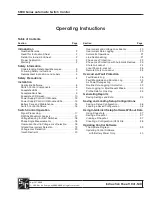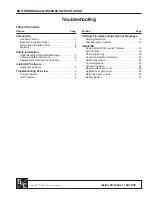
Flex EM/EX HazLoc System Instruction Manual
June 2019
Page 6 of 62
1 Introduction
The Flex radio remote control systems are designed for control of industrial equipment and machinery
such as overhead traveling cranes, jib cranes, gantry cranes, tower cranes, electric hoists, winches,
monorails, conveyor belts, mining equipment and other material handling equipment where wireless
control is preferred.
Each Flex HazLoc system consists of a Flex HazLoc transmitter handset and Flex receiver unit. Other
standard-equipped accessories include transmitter waist belt, spare transmitter power key, clear vinyl
pouch, “AA” alkaline batteries, compass direction decal sheet and user’s manual.
List of notable features includes:
•
62 user-programmable channels
– Advanced synthesized RF controls with 62 built-in channels;
there are no more fixed channels and fragile quartz crystals to break.
•
Automatic channel scanning receiver
– No more hassle of climbing up the crane to change
receiver channels.
•
Over 1 million unique ID codes (20-bit)
– Every Flex system has its own unique ID codes and
serial number; no repeats.
•
Advanced controls
– The Flex system utilizes advanced microprocessor controls with 32-bit
CRC and Hamming Code, which provide ultra-fast, safe, precise, and error-free encoding and
decoding.
•
Unique I-CHIP design
– The I-CHIP functions in a way that is very similar to SIM cards used on
mobile phones, with the ability to transfer system information and settings from one transmitter to
another without the hassle of resetting the spares.
•
Reliable pushbuttons
– The in-house-designed pushbuttons with gold-plated contacts are rated
for more than 1 million press cycles.
•
Low power consumption
– Requires only two “AA” alkaline batteries for more than 100 hours of
operating time between replacements.
•
Ultra-durable nylon and fiberglass composite enclosures
– Highly resistant to breakage and
deformation, even in the most abusive environments.
•
Full compliance
– All systems fully comply with the FCC Part-15 Rules, European Directives
(Safety, EMC, RED, and Machinery), and Industry Canada Specifications (IC).







































